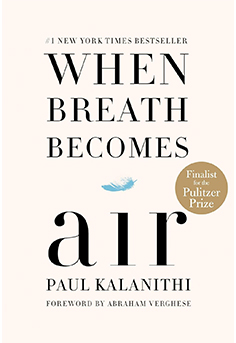
 |
When Breath Becomes Air |
by Paul Kalanithi |
 |
Book Review |
 |
| (by- Linda ) |
When Breath Becomes Air is one of those books that really sticks with you. Paul Kalanithi was a young neurosurgeon when he found out he had terminal cancer, and he decided to write about it-about his life, his work, and what it's like to face the end. It's part memoir, part reflection, and he writes with such honesty and thoughtfulness that it hits you on a deep level. It's not an easy read emotionally, but it's so worth it. His words make you slow down and really think about what matters-how we spend our time, what gives life meaning, and the people we love. It's sad, yes, but also full of hope and perspective. A beautiful, unforgettable book. |
Book Summary |
#1 NEW YORK TIMES BESTSELLER - PULITZER PRIZE FINALIST - This inspiring, exquisitely observed memoir finds hope and beauty in the face of insurmountable odds as an idealistic young neurosurgeon attempts to answer the question, What makes a life worth living? "Unmissable ... Finishing this book and then forgetting about it is simply not an option."-Janet Maslin, The New York Times ONE OF THE BEST BOOKS OF THE YEAR: The New York Times Book Review, People, NPR, The Washington Post, Slate, Harper's Bazaar, Time Out New York, Publishers Weekly, BookPage An Oprah Daily Best Nonfiction Book of the Past Two Decades - A Kirkus Reviews Best Nonfiction Book of the Century At the age of thirty-six, on the verge of completing a decade's worth of training as a neurosurgeon, Paul Kalanithi was diagnosed with stage IV lung cancer. One day he was a doctor treating the dying, and the next he was a patient struggling to live. And just like that, the future he and his wife had imagined evaporated. When Breath Becomes Air chronicles Kalanithi's transformation from a naive medical student "possessed," as he wrote, "by the question of what, given that all organisms die, makes a virtuous and meaningful life" into a neurosurgeon at Stanford working in the brain, the most critical place for human identity, and finally into a patient and new father confronting his own mortality. What makes life worth living in the face of death? What do you do when the future, no longer a ladder toward your goals in life, flattens out into a perpetual present? What does it mean to have a child, to nurture a new life as another fades away? These are some of the questions Kalanithi wrestles with in this profoundly moving, exquisitely observed memoir. Paul Kalanithi died in March 2015, while working on this book, yet his words live on as a guide and a gift to us all. "I began to realize that coming face to face with my own mortality, in a sense, had changed nothing and everything," he wrote. "Seven words from Samuel Beckett began to repeat in my head: 'I can't go on. I'll go on.'" When Breath Becomes Air is an unforgettable, life-affirming reflection on the challenge of facing death and on the relationship between doctor and patient, from a brilliant writer who became both. Finalist for the PEN Center USA Literary Award in Creative Nonfiction and the Books for a Better Life Award in Inspirational Memoir |
Discussion Questions |
1. How did you come away feeling, after reading this book? Upset? Inspired? Anxious? Less afraid?
2. What did you think of Paul's exploration of the relationship between science and faith? As Paul wrote, "Science may provide the most useful way to organize empirical, reproducible data, but its power to do so is predicated on its inability to grasp the most central aspects of human life: hope, fear, love, hate, beauty, envy, honor, weakness, striving, suffering, virtue. Between these core passions and scientific theory, there will always be a gap. No system of thought can contain the fullness of human experience." Do you agree? 3. How do you think the years Paul spent, tending to patients and training to be a neurosurgeon, affected the outlook he had on his own illness? When Paul wrote that the question he asked himself was not "why me," but "why not me," how did that strike you? Could you relate to it? 4. Paul had a strong background in the humanities, and read widely throughout his life. Only after getting a Master's in English Literature did he decide that medicine was the right path for him. Do you think this made him a better doctor? A different kind of doctor? If so, how? How has reading influenced your life? 5. What did you think of Paul and Lucy's decision to have a child, in the face of his illness? When Lucy asked him if he worried that having a child would make his death more painful, and Paul responded, "Wouldn't it be great if it did," how did that strike you? Do you agree that life should not be about avoiding suffering, but about creating meaning? 6. Were there passages or sentences that struck you as particularly profound or moving? 7. Given that Paul died before the book was finished, what are some of the questions you would have wanted to ask him if he were still here today? 8. Paul was determined to face death with integrity, and through his book, demystify it for people. Do you think he succeeded? 9. In Lucy's epilogue, she writes that "what happened to Paul was tragic, but he was not a tragedy." Did you come away feeling the same way? 10. How did this book impact your thoughts about medical care? The patient-physician relationship? End of life care? 11. Is this a book you will continue thinking about, now that you are done? Do you find it having an impact on the way you go about your days? 12. Lucy also writes that, in some ways, Paul's illness brought them closer - that she FELL feel even more deeply in love with the "beautiful , focused man" he became in the last year of his life. Did you find yourself seeing how that could happen? Discussion Questions by the Publisher Book Club Talking Points:
"When Breath Becomes Air is the kind of memoir that sticks with you. Dr. Kalanithi's story is emotional, thoughtful, and full of big questions about life, purpose, and how we spend our time. He writes not just as a neurosurgeon, but as someone facing his own mortality, and that gives the book so much depth. It opens the door to meaningful conversations about faith, hope, and those tough end-of-life choices we don't always talk about. It's a moving and hopeful read that will leave everyone in your book club with much to think about and discuss. |
Praise |
I guarantee that finishing this book and then forgetting about it is simply not an option... . Part of this book's tremendous impact comes from the obvious fact that its author was such a brilliant polymath. None of it is maudlin. Nothing is exaggerated. As he wrote to a friend: 'It's just tragic enough and just imaginable enough.' And just important enough to be unmissable."-Janet Maslin, The New York Times "Paul Kalanithi's memoir, When Breath Becomes Air, written as he faced a terminal cancer diagnosis, is inherently sad. But it's an emotional investment well worth making: a moving and thoughtful memoir of family, medicine and literature. It is, despite its grim undertone, accidentally inspiring."-The Washington Post "Kalanithi uses the pages in this book to not only tell his story, but also share his ideas on how to approach death with grace and what it means to be fully alive."-James Clear, #1 New York Times bestselling author of Atomic Habits "Paul Kalanithi's posthumous memoir, When Breath Becomes Air, possesses the gravity and wisdom of an ancient Greek tragedy. ... The book brims with insightful reflections on mortality that are especially poignant coming from a trained physician familiar with what lies ahead... ."-The Boston Globe "Devastating and spectacular ... [Kalanithi] is so likeable, so relatable, and so humble, that you become immersed in his world and forget where it's all heading."-USA Today "It's [Kalanithi's] unsentimental approach that makes When Breath Becomes Air so original-and so devastating... . Its only fault is that the book, like his life, ends much too early."-Entertainment Weekly "[When Breath Becomes Air] split my head open with its beauty."-Cheryl Strayed "Rattling, heartbreaking, and ultimately beautiful, the too-young Dr. Kalanithi's memoir is proof that the dying are the ones who have the most to teach us about life."-Atul Gawande "Thanks to When Breath Becomes Air, those of us who never met Paul Kalanithi will both mourn his death and benefit from his life. This is one of a handful of books I consider to be a universal donor-I would recommend it to anyone, everyone."-Ann Patchett "Dr. Kalanithi describes, clearly and simply, and entirely without self-pity, his journey from innocent medical student to professionally detached and all-powerful neurosurgeon to helpless patient, dying from cancer. Every doctor should read this book-written by a member of our own tribe, it helps us understand and overcome the barriers we all erect between ourselves and our patients as soon as we are out of medical school."-Henry Marsh, author of Do No Harm: Stories of Life, Death, and Brain Surgery |
You May Also Like |
 The Book of Doors
Book Review:This book is a must-read for anyone who's interested in the fashion world or enjoys reading stories about female friendships. It follows the journey of Gloria and Estee Lauder, two women who share their dreams of working in ...More
|
 The BoyfriendBook ReviewAnother Freida McFadden book that is guaranteed to keep you guessing. Sydney Shaw is a young 30-something woman living and dating in NYC. Sydney is very relatable. Partly because what female hasn't had ... More
|
 The Violin Conspiracy
This book grabbed my attention from the very beginning, with the opening playing beautiful classical music. A few times throughout the book, there are additional snippets of music. It's one of the bonuses of listening to a book on audio ...More
|
 Local Woman MissingLocal Woman Missing is a gripping psychological thriller by Mary Kubica, filled with suspense, mystery, and secrets. I loved how this book grabbed from the first chapter and had me on the edge of my seat... More
|
|
You May Also Like |
 |








